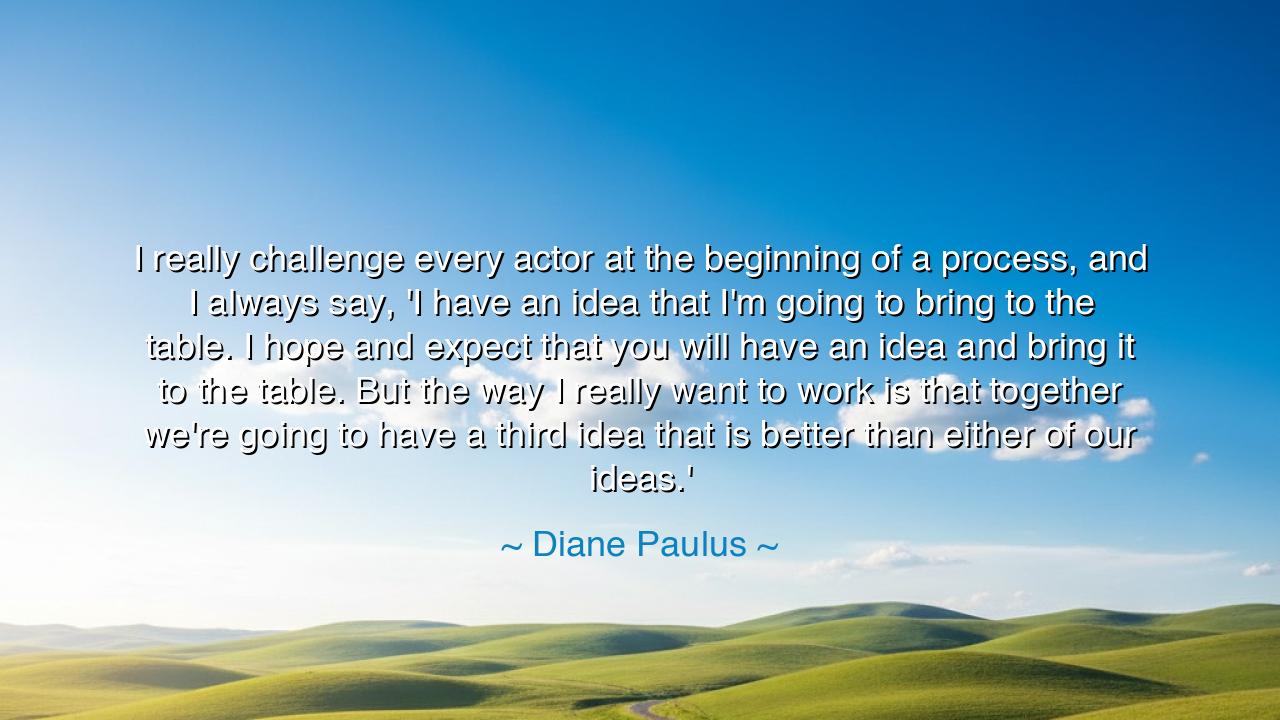
I really challenge every actor at the beginning of a process, and
I really challenge every actor at the beginning of a process, and I always say, 'I have an idea that I'm going to bring to the table. I hope and expect that you will have an idea and bring it to the table. But the way I really want to work is that together we're going to have a third idea that is better than either of our ideas.'






“I really challenge every actor at the beginning of a process, and I always say, ‘I have an idea that I’m going to bring to the table. I hope and expect that you will have an idea and bring it to the table. But the way I really want to work is that together we’re going to have a third idea that is better than either of our ideas.’” Thus spoke Diane Paulus, a visionary of the modern stage, whose art is not born from dominance but from collaboration, whose power lies not in control but in the alchemy of creation shared. In these words, she reveals a truth older than theatre itself — that the highest form of artistry, and indeed of life, is co-creation: the meeting of minds and spirits in pursuit of something greater than any one person could conceive alone.
Paulus speaks as the ancients might have spoken of fire — a force that requires both spark and tinder to live. Her “third idea” is that flame — a new creation, born of the tension, humility, and trust between collaborators. It is not her idea, nor the actor’s, but the living child of both, stronger and wiser for its shared parentage. To work in this way demands courage, for it means surrendering the comfort of control. It means believing that another’s insight may illuminate your own, that together you might reach heights neither could scale alone. This, Paulus teaches, is the essence of leadership — not command, but communion.
Such wisdom echoes through history. Consider Michelangelo, who once said that his sculptures already existed within the marble, and that he merely freed them. Yet even he, the master of stone, depended on others — the craftsmen who carved rough forms, the architects who balanced structure and light, the patrons whose faith made his art possible. Creation, in truth, has never been solitary. It is a dance of many hands, each guided by its own vision, yet moving to one rhythm. Paulus reminds us that greatness is not born of isolation, but of relationship — of ideas meeting and transforming in the fire of shared purpose.
In her rehearsal rooms, Paulus does what the ancient philosophers urged: she creates a dialogue of minds. Each participant comes not as a servant to the director’s will, but as a partner in the act of becoming. In that sacred space, ego must bow before the muse of collaboration. For the “third idea” does not appear to the proud or possessive; it reveals itself only to those who listen — who dare to let go of the need to be right, and instead seek to be true. In this way, Paulus’s words are not merely about theatre, but about the art of living wisely among others.
The third idea is the miracle that occurs when love of one’s own thought meets respect for another’s. It is the bridge between minds, the revelation that truth is not owned but discovered. How many conflicts in the world — in art, in politics, in family — arise because each clings to their own idea as supreme? Yet if we approached one another as Paulus does her actors — offering our thoughts, receiving others’, and laboring to create a “third thing” — then peace, innovation, and understanding would flourish like flowers after rain. For collaboration is the antidote to arrogance, and humility is the mother of progress.
Let us then remember the lesson of Athens, cradle of democracy, where the greatest ideas were not decreed by kings but debated in open forums. There, as in Paulus’s rehearsal room, truth was a living process — born from conflict, polished by reason, elevated by unity. The Greeks knew what we too easily forget: that no mind, however brilliant, holds the entire light. It is only when minds meet that the light becomes whole. So too in art, so too in life: the third idea is the dawn that follows the meeting of stars.
Therefore, dear seeker, let this teaching guide your path. When you enter the circle of creation — whether in art, in work, in love — come bearing your ideas proudly, but hold them lightly. Listen as deeply as you speak. Seek not to triumph, but to transform. For in that sacred exchange, you will discover the wonder that Paulus speaks of: the moment when two wills, joined in humility and passion, give birth to something that belongs to neither — and yet uplifts both. That is the secret of all creation, the alchemy of the shared soul.
And so, may you, too, learn to create the “third idea.” Whether in your craft or in your daily living, may you seek not to conquer but to collaborate, not to insist but to imagine together. For the world does not hunger for more voices shouting their truths alone; it longs for those brave enough to build a harmony — a chorus of hearts — where every idea becomes part of something better, braver, and more beautiful than the self.






AAdministratorAdministrator
Welcome, honored guests. Please leave a comment, we will respond soon